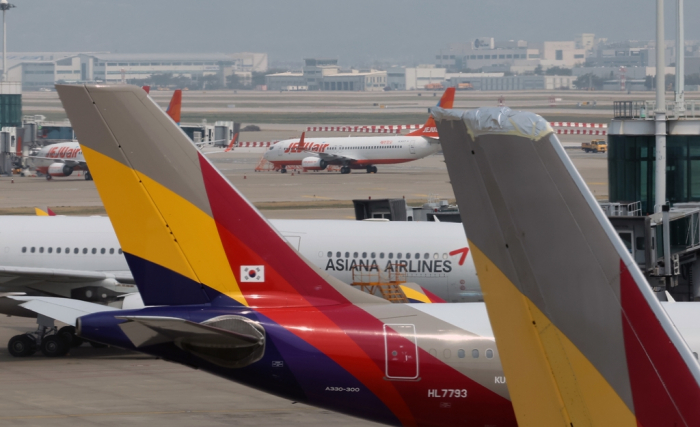Airlines
OPEC output cut to worsen Korean airlines’ woes
Asiana is estimated to have fallen into a full capital impairment at end-Q3; higher oil prices may aggregate the problem in Q4
By Oct 06, 2022 (Gmt+09:00)
2
Min read
Most Read
LG Chem to sell water filter business to Glenwood PE for $692 million


Kyobo Life poised to buy Japan’s SBI Group-owned savings bank


KT&G eyes overseas M&A after rejecting activist fund's offer


StockX in merger talks with Naver’s online reseller Kream


Mirae Asset to be named Korea Post’s core real estate fund operator



South Korea’s airlines, already slammed by a weaker won currency and rising interest rates, are expected to suffer more from global major oil producers’ decision to cut output.
Asiana Airlines Inc., the country’s No. 2 carrier, is estimated to have fallen into a full capital impairment at the end of the third quarter as the ailing won ramped up its foreign currency translation loss.
Higher crude prices are expected to further deteriorate its impaired capital, which occurs when a company’s total capital becomes less than the par value of its capital stock. Rising fuel prices amid a weaker won are likely to hurt Asiana more in the fourth quarter. The airline offset the impact of the won’s weakness with lower oil prices in the previous three months.
Asiana already spent $592.1 million on jet fuel in the first half.
“Higher oil prices push up not only costs but also fuel surcharges. That will hurt demand,” said an Asiana official.
OPEC and non-OPEC allies, a group often referred to as OPEC+, on Wednesday decided to reduce production by 2 million barrels a day from November.
BUDGET AIRLINES HIT HARDEST
The situation at low-cost carriers is even worse. Air Busan Co. and Air Seoul - Asiana’s budget airline units – as well as their competitors such as Jin Air of Korean Air Lines Co., Jeju Air Co. and T'way Air Co. are scrambling for measures to deal with a weaker won, surging interest rates and higher oil prices.
Listed companies that are likely to report impaired capital by year-end may be delisted unless they come up with emergency measures to increase capital.
The country’s top carrier Korean Air, which is not in financial trouble, is also predicted to face a headwind from the oil producers’ decision, given its expenses of nearly $1.4 billion for jet fuel in the first half.
On the other hand, South Korea’s refiners may improve their profits on the OPEC+ plan to reduce output. Higher crude prices often raise inventory gains, while refining margins could increase if petroleum product prices grow.
But the impact of the oil output cut may not be as strong as some hoped as the global economy has been losing steam, industry sources said.
“There are bullish factors for oil prices such as geopolitical risk and the OPEC’s output cut decision, but we also have bearish factors including the prolonged US-China trade dispute and a slowing global economy,” said an official at a local refiner. “So, it is hard to expect oil prices to keep rising.”
Write to Sang-Eun Lee at selee@hankyung.com
Jongwoo Cheon edited this article.
More to Read
-
 EconomySinking won fans doubts over Korea’s economic fundamentals
EconomySinking won fans doubts over Korea’s economic fundamentalsSep 29, 2022 (Gmt+09:00)
4 Min read -
 EconomyTanking won deteriorates Korea’s dollar funding conditions
EconomyTanking won deteriorates Korea’s dollar funding conditionsSep 26, 2022 (Gmt+09:00)
3 Min read
Comment 0
LOG IN


